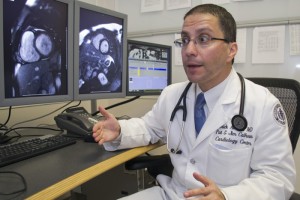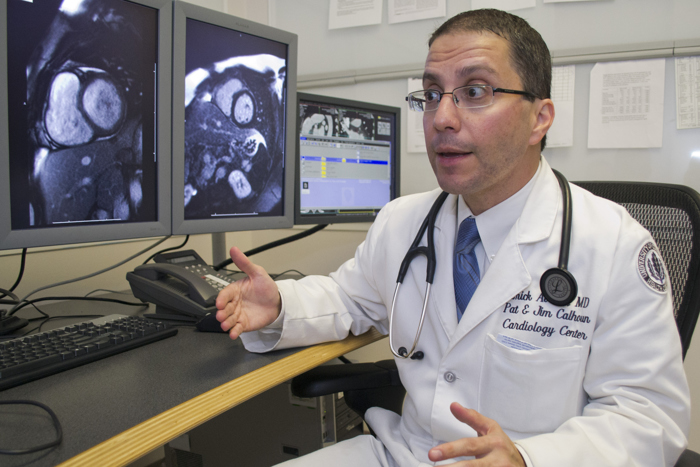
Click image for high-res jpeg.
The Connecticut Breast Health Initiative has awarded Dr. Erick Avelar, director of noninvasive cardiac imaging research at the Pat and Jim Calhoun Cardiology Center, a grant to continue studying ways to detect heart injury associated with chemotherapy in breast cancer survivors.
The research aims to determine the effectiveness of cardiac magnetic resonance imaging (MRI) and more sophisticated heart ultrasound studies, in finding signs of cardiac injury in women who are undergoing chemotherapy to treat breast cancer. The researchers also are looking at a particular protein fragment in the blood released by an injured heart to determine if it may be an early indicator of cardiac injury.
“The Connecticut Breast Health Initiative recognizes the importance of this research, and for that we are most grateful,” Avelar says. “Advances in cancer treatment have outpaced advances in prevention of cardiovascular disease, and as a result, a woman diagnosed with breast cancer is now more likely to die of heart disease than her cancer. Furthermore, chemotherapy’s impact on cardiovascular health can happen at any time after the treatment.”
A case report published in the June 2012 Texas Heart Institute Journal by Avelar illustrates this. It tells of a previously normal breast cancer survivor who experienced heart problems 17 years after her chemotherapy.
The Connecticut Breast Health Initiative awarded a similar grant in 2010. Its methodology was chosen for presentation at the San Antonio Breast Cancer Symposium, regarded as one of the most prestigious conferences of its kind. Dr. Ravi Marfatia, a UConn Health Center hospitalist who joined the study last year, presented the poster in December.
The 2012 grant is a continuation of the research that extends the follow-up period from six months to one year.
“This area of study is especially crucial, one that spans both cardiology and cancer,” says Dr. Frank M. Torti, UConn Health Center executive vice president for health affairs and medical school dean. “It has great promise as potentially life-saving research.”
Torti studied the effects of chemotherapy on heart health while at Wake Forest University, where he was cancer center director and chair of the Department of Cancer Biology before joining UConn in May.
“While the definition of cardiotoxicity historically has been an arbitrary percentage decrease in heart function measured by various imaging methods, it’s unknown how the heart responds normally to chemo agents,” Avelar says. “In addition, the detection of cardiotoxicity for the most part occurs at the late stage of heart dysfunction, when the patient is already symptomatic. We want to detect abnormality early so we can treat it early and possibly decrease the morbidity and mortality of this population. This goes beyond what has been done in this area, and is the type of multidisciplinary research that can help build the foundation for a formal cardio-oncology program here at UConn.”
Avelar is the lead investigator of the project, titled “Early Detection of Cardiotoxicity by Advanced Cardiac Imaging and a Novel Biomarker in Breast Cancer Patients Undergoing Chemotherapy.” His co-investigators include Dr. Susan Tannenbaum, medical director of the Carole and Ray Neag Comprehensive Cancer Center’s Clinical and Translational Breast Program, Dr. Bruce Liang, director of the Calhoun Cardiology Center, and Dr. Douglas Fellows, chair of Diagnostic Imaging and Therapeutics.
Women whose breast cancer treatment includes chemotherapy will be eligible to participate in the study.
“The Connecticut Breast Health Initiative is committed to raising funds in order to support leading-edge breast cancer research in Connecticut,” says Connecticut Breast Health Initiative President Joyce Bray. “We take great care in discerning projects of need and innovation. Dr. Avelar’s work will contribute to the quality and longevity of breast cancer survivors.”
Follow the UConn Health Center on Facebook, Twitter and YouTube.



